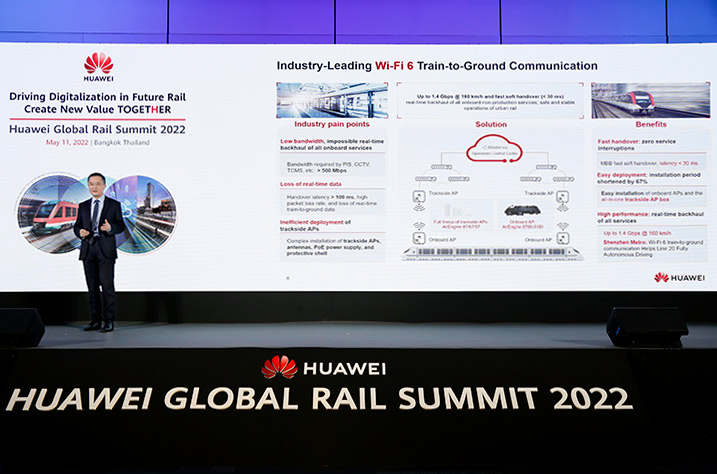This site uses cookies. By continuing to browse the site you are agreeing to our use of cookies. Read our privacy policy>
![]()
This site uses cookies. By continuing to browse the site you are agreeing to our use of cookies. Read our privacy policy>
![]()
Enterprise products, solutions & services
[Bangkok, Thailand, May 11, 2022] The Huawei Global Rail Summit 2022 was successfully held during the Asia Pacific Rail 2022 in Bangkok, Thailand. This prestigious event brings together thought leaders, futurists, and key stakeholders from the global rail industry to share insights into industry trends and best practices around digital transformation.
The rail industry aspires to build securer, smarter, more convenient, more efficient, and greener urban rail, which places higher requirements on networks. However, today's urban rail networks suffer from low Wi-Fi bandwidth for train-to-ground service backhaul, frequent loss of real-time data, and low installation and deployment efficiency. This makes it impossible to achieve real-time backhaul of all typical bandwidth-hungry services such as passenger information system (PIS).
Xiang Xi, Vice President of the Global Transportation Business Unit, Huawei's Enterprise Business Group, shed some light on Huawei's innovative Wi-Fi 6 solution for train-to-ground communications in his keynote speech titled "Driving Digitalization in Future Rail to Create New Value Together".
"Huawei's Wi-Fi 6 Train-to-Ground Communications Solution draws on many technological innovations to achieve up to 1.4 Gbit/s bandwidth for real-time service transmission when trains are running at a speed of 160 km/h," said Xiang Xi. "It also ensures zero service interruptions by slashing the network handover latency for train-to-ground communications to less than 30 ms. Beyond that, the all-in-one integrated chassis is easy to deploy, shortening the installation period by 67%. Ultimately, this results in stable operations of urban rail."

Xiang Xi, Vice President of Huawei's Global Transportation Business Unit, delivers a keynote speech
Huawei's Wi-Fi 6 Train-to-Ground Communications Solution has proven highly valuable in Shenzhen Metro's Line 20. Equipped with Huawei's solution, Shenzhen Metro's Line 20 builds industry-leading commercial Wi-Fi 6 connectivity for train-to-ground communications, and benefits from always-on, large-bandwidth, and low-latency backhaul of all services needed for autonomous driving urban rail. In turn, this delivers all-new safe travel experience for passengers through smart urban rail.
Huawei showcased a full suite of innovative rail transport solutions and flagship products at the Huawei Global Rail Summit 2022. In particular, Huawei's innovative low-carbon intelligent campus network solution for station campuses took the spotlight. This ground-breaking solution stands out with an all-new simplified network architecture, plug-and-play remote units (RUs), and green, energy-saving design. Such powerful capabilities allow the network to stay ahead in the sustainable development of station services.
The compelling benefits of this solution include:
• Simplified architecture with "one device, one network": The innovative simplified network architecture consists of the central switch and RUs, with RUs serving as the extended ports of the central switch and deployed onto desktops. This ensures all terminals can access the network through nearby RUs, in turn minimizing cabling from the extra-low voltage (ELV) room to terminals.
• Always-on services and smooth network evolution: By leveraging the industry-leading optical-electrical PoE technology, the central switch can supply PoE++ (60 W) to RUs at ultra-long distances of 300 m. This eliminates the need of ELV boxes and cabinets and effectively addresses the difficulty in obtaining local power supply. In addition, the hybrid cable offers ultra-high bandwidth and allows for one-off cabling to support network evolution for the next 15 years.
• Green, low-carbon, energy-efficient outcomes: In the simplified architecture, RUs require no planning, configuration, or management, reducing the number of managed nodes by more than 80%. Furthermore, RUs adopt energy-efficiency and fan-free design to achieve super quietness and energy saving, with the typical power consumption less than 7 W for an RU and less than 1 W per port on average.
With unmatched technical expertise and experience in digital transformation, Huawei will continue to dive deep into more urban rail use cases and work closely with more customers and partners to jointly explore innovative solutions. In this way, Huawei will help to accelerate digital transformation in smart urban rail.